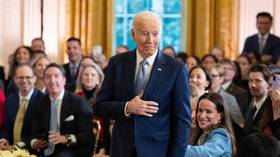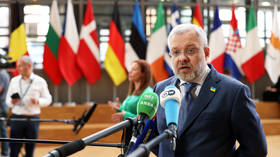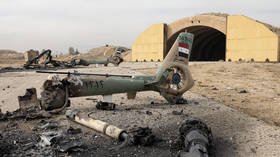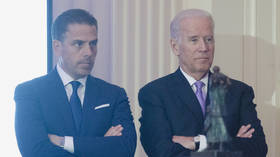Former OPCW director defends Douma whistleblowers as ‘extremely competent’, slams media for creating ‘wall of silence’
The former head of the OPCW has defended the whistleblowers who alleged that it engaged in a cover-up of exonerating evidence in Douma, arguing efforts to silence him prove the dissenters right.
Jose Bustani, the OPCW’s founding director general, has fiercely defended the inspectors who braved political pressure from their own organization along with the US and its allies to expose the apparent cover-up of evidence countering Washington’s hole-filled narrative that Syrian President Bashar Assad’s government used chemical weapons in Douma in April 2018.
In an interview with the Grayzone, Bustani lamented the political co-option of the body he helped establish by the US, which – together with its allies, including Britain and France – barred him from testifying before the UN Security Council earlier this month, using the bizarre excuse that he lacked the expertise to speak about the operations of the organization he once led.
Also on rt.com The UK & US alliance brings the UNSC into disrepute by banning Syria chemical weapons briefing from ex-OPCW headNot only are the Douma whistleblowers “extremely competent…extremely professional and extremely reliable” – trusted colleagues from his early days at the OPCW – but the group’s very reluctance to hear them out signaled it lacked confidence in its own revised conclusions of Syrian guilt in the Douma attack, Bustani told the outlet. The body’s insistence Assad had used chemical weapons was held up after the fact to justify US airstrikes on Damascus.
“If the OPCW is confident in the robustness of its scientific work on Douma,” Bustani explained, referring to the official report alleging the use of chlorine gas on civilians by the Assad government, “it should have little to fear in hearing out its inspectors.”
If, however, the claims of evidence suppression, selective use of data, and exclusion of key investigators, among other allegations, are not unfounded, then it’s even more imperative that it should be dealt with openly and urgently.
Bustani explained he had volunteered to testify before the UN Security Council because he felt it was his “duty” to help the whistleblower inspectors get the fair hearing they had been denied and bring their concerns to a wider audience. The inspectors, who only resorted to leaking their version of the report last year after complete institutional stonewalling, “are an asset to the OPCW” and giving them an opportunity to “set the record straight” would repair the organization’s greatly damaged credibility, Bustani said.
He expressed horror that a delegation of US officials had reportedly met with OPCW inspectors early on in the investigation to “convince them a chlorine attack had occurred” after the body’s initial report questioning whether there had been a chemical attack at all had been allegedly doctored to be more favorable to the US narrative. Bustani speculated that perhaps the inspectors had been intimidated into meeting with the Americans, stating emphatically that “If I were [still] Director General, this would never have happened.”
The veteran diplomat is certainly no stranger to US intimidation, having infamously been bullied out of his position in the run-up to the Iraq War by the Bush administration, specifically cabinet official John Bolton. Bustani was allegedly given “24 hours to leave the organization” in 2002 after his efforts to bring Iraq into the OPCW threatened to scuttle the administration’s flimsy “weapons of mass destruction” narrative. Making a personal visit to the OPCW’s The Hague headquarters in March 2002 to inform Bustani that the war-hungry Bush administration didn’t like the diplomat’s “management style,” Bolton supposedly told him “we have ways to retaliate against you,” making a pointed mention of his “two sons in New York.”
After an initial effort to pressure member states into voting him out failed, the US threatened to withhold funds from the OPCW and even began surveilling his office.
Bustani shared more details about the US-led efforts to get him to “resign” in 2002, including that the wall behind his desk was “full of listening equipment” and that it took an investigator two days to remove all the devices. When he tried to bring the surveillance to the head of security for the organization, the official and all the equipment in his “huge office” simply “disappeared” – a bizarre event Bustani said was never explained.
Also on rt.com OPCW should not be a ‘geopolitical tool,’ Russian envoy tells UN Security Council as Germany seeks to involve it in Navalny caseBustani was also highly critical of the mainstream media’s sweeping failure to cover the scandal with the exception of the occasional critical piece slandering the whistleblowers, noting that in his experience even nominal coverage from the New York Times or Le Monde would have “really helped” to convince the OPCW to take action in hearing out the dissenters’ concerns. Even commentators who had supported him against the Bush administration's warmongers in 2002 had willingly participated in the creation of an “impenetrable wall of silence” that prevented the investigators from being heard, he complained, noting that the apparent embargo persists more than a year after the “real” report on the events in Douma in April 2018 was leaked.
Three members of the OPCW’s Douma Fact-Finding Mission have come forward to challenge the body’s official conclusion that the Assad government used chlorine gas on Syrian civilians in the attack that was immediately – before any sort of investigation could be conducted – met with retaliatory US airstrikes. One of the whistleblowers stated when he came forward in November at a Brussels briefing organized by the Courage Foundation that “most of the Douma team felt the two reports on the incident…were scientifically impoverished, procedurally irregular and possibly fraudulent,” and that evidence had been tampered with.
The organization has refused to consider the whistleblowers’ claims, instead denouncing the investigators as not credible and recommending tighter security measures to prevent further leaks.
Think your friends would be interested? Share this story!












